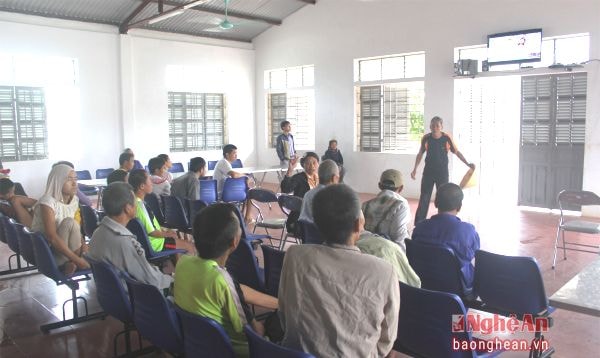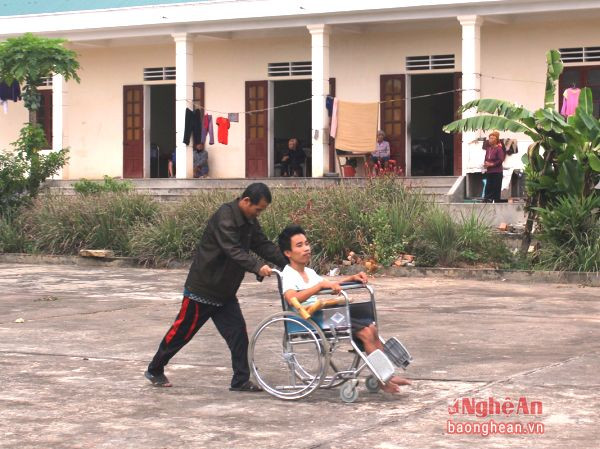'Loopholes' in managing mentally ill people
(Baonghean) - The number of mentally ill people committing crimes has been on the rise recently, especially in serious cases. How to prevent, deter criminal behavior and better manage this group in the community is still limited.
Painful mental illness committed crimes
The people of Hamlet 11, Nghi Xa Commune (Nghi Loc) still cannot forget the death of Mr. Hoang Van Chau when he was stabbed many times in his own family on May 20, 2016. The perpetrator who stabbed Mr. Chau was none other than Hoang Van Nhat (born in 1990) - his son. Mr. Chau's death shocked and worried everyone because Nhat was mentally ill. The family had taken Nhat to Nghe An Mental Hospital for treatment for a while, but when the treatment was about to end, they asked to let Nhat go home because they were afraid of having his name in the local mental health monitoring book. And the unexpected thing was that, in a dark night, Nhat used a knife to kill his own father.
In Hamlet 1, Nghi Cong Nam Commune, Nghi Loc District, the family of Mrs. Tran Thi Yen (born in 1963, residing in Hamlet 1, Nghi Cong Nam Commune) has two people with mental illness, including Mrs. Yen and her eldest daughter. Currently, both mother and daughter are receiving outpatient treatment at home. While Mrs. Yen is more alert and can do some chores around the house, her daughter Pham Thi Hoa is unable to work. Although she has been taking medication regularly, her temperament is extremely erratic. One evening in May 2016, during a bout of illness, she took a knife and slashed her sleeping brother. Luckily, her brother was only injured in the hand.
 |
| Severely mentally ill patients are treated at the Provincial Social Protection Center. |
At the meeting of the Provincial People's Council in early July 2016, Colonel Nguyen Huu Cau - Director of the Provincial Police Department said that the loss of civil capacity has caused many tragic cases with a tendency to develop complicatedly. In the first 6 months of 2016 alone, there were 12 murder cases, including mentally ill subjects who killed their family members.
According to Colonel Nguyen Huu Cau, the investigation of these cases is extremely difficult due to legal issues. Before 2013, for murderers with mental illness or suspected mental illness, the provincial police and the provincial People's Procuracy would complete the paperwork within 5 days to send them to the provincial psychiatric hospital for assessment, treatment and conclusion there. But now the Central Government has stipulated that they must be sent to Hanoi and it takes up to 6 months to send them for assessment. The long time makes it difficult for the police to manage the subjects.
 |
| According to incomplete statistics, from 2015 to present, there have been about 30 cases related to mentally ill people in the province. |
On the other hand, if some relatives and family members still show estrangement and discrimination after returning from treatment, the illness may relapse and pose a potential danger to the community. According to regulations, even if they commit serious crimes, people with severe mental illness will not be held responsible for their actions. Therefore, when a case occurs, the investigation agency must request a psychiatric assessment. If it is concluded that the subject's illness does not warrant criminal responsibility, the Procuracy will issue a decision not to prosecute, along with a decision to undergo compulsory medical treatment. At that time, the investigation agency will take them for treatment until they are stable, then hand them over to their family and locality.
Inadequacies in management
Currently, more than 95% of mentally ill people are being managed, monitored and treated at home. However, assigning family management to these people is extremely difficult and poses many potential risks to the community. Mr. Vo Van Tue (Hamlet 2, Nghi Xa Commune, Nghi Loc) has suffered from mental illness for nearly 20 years. Because he is being cared for by relatives, Mr. Tue is not eligible to be sent to the Provincial Social Protection Center. However, the progression of his illness is unpredictable, so Mr. Tue's family had to lock him up in the old house his parents left behind. Ms. Dang Thi Phuong (Mr. Tue's sister-in-law) said: "The family really wants to take him (Mr. Tue - PV) to the center but does not have the conditions. Every time he has an attack, he breaks things, wanders around the streets and causes accidents for himself. The family has no choice but to lock him up..."
 |
| Ms. Nguyen Thi Viet (left - Nhat's mother) recounts the incident of her son's crime. |
Mr. Nguyen Dang Duong - Deputy Director of the Department of Labor, Invalids and Social Affairs said: Managing this group is very difficult because most of the families are in difficult circumstances, the ability to care for and treat is very limited, so the disease becomes more and more serious. When this group has an attack, the family has no measures to prevent or guard against it. And the family often has to chain and shackle them.
Currently, there is no legal document that stipulates who or which agency is responsible for sending mentally ill people to medical facilities for examination and treatment when they have not yet committed a crime. Compulsory treatment is only applied from the investigation stage according to the decision of the competent authority, that is, when there are consequences of a violation of criminal law. There are many other people with mental illness who have no one to manage them, only their families are interested in their treatment. And the problem of preventing tragedies caused by mentally ill people; or prosecuting responsibility when mentally ill people commit crimes; or compensating victims for damages? These are questions that are not easy to answer.
 |
| Because of fear that Mr. Tue would injure himself and others, his family had to lock him in the house for many years. |
Doctor Phan Kim Thin - Director of Nghe An Mental Hospital said: There are nearly 500 mental illnesses, of which 15% are chronic mental illnesses, which are difficult to cure, the remaining 85% can be cured if detected and treated early. According to the plan, Nghe An is allocated 960 million VND each year from the central government, in addition to the provincial budget to provide free medicine for patients. However, this year, the hospital has not received funding and is currently using outpatient treatment resources for patients. This source will run out by the end of September, after September the hospital will have to be self-sufficient.
| Nghe An currently has 14,311 people with mental disabilities, including 107 severely mentally ill patients without caregivers who are currently being managed at the Provincial Social Protection Center, and about 300 inpatients at Nghe An Mental Hospital. The rest are managed by their families. |
Pham Bang


